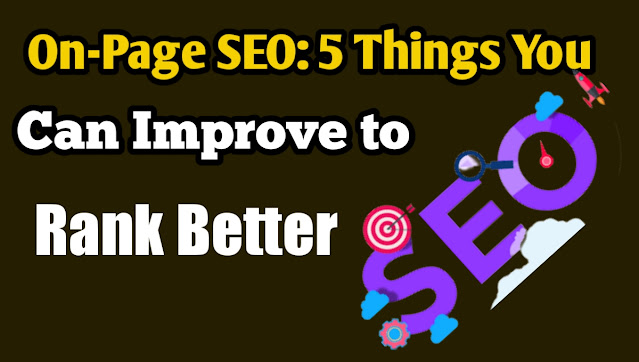There are many different things that you can do to improve your on-page SEO. In this blog post, we will discuss five of the most important ones. By optimizing these factors, you will be able to rank better on keywords and generate more traffic to your website. Let’s get started!
On-Page SEO: 5 Things You Can Improve to Rank Better
It is impossible to control all the factors that make you rank on keywords in search engines, but you can start by optimizing everything on your website for keyword prominence and density.
There are many different things that you can do to improve your on-page SEO. In this blog post, we will discuss five of the most important ones. By optimizing these factors, you will be able to rank better on keywords and generate more traffic to your website. Let’s get started!
The first thing that you can do to improve your on-page SEO is to optimize your title tags. Title tags are the most important elements on your page, and they should include your target keyword. Make sure that your title tags are unique and descriptive, and include your target keyword early on.
What is on-page SEO?
On-page SEO refers to the optimization of the elements on your website in order to rank higher on search engine results pages (SERPs). This includes factors such as the title tags, meta tags, header tags, and images. By optimizing these elements, you can improve your website’s visibility and organic traffic.
The second thing that you can do to improve your on-page SEO is to optimize your meta tags. Meta tags are the HTML tags that provide information about your web page. They include the title tag, meta description, and meta keywords. These elements are important because they help search engines understand what your page is about. Make sure that your meta tags are accurate and include your target keyword.
5 most important on-page SEO factors
The third thing that you can do to improve your on-page SEO is to optimize your header tags. Header tags are the HTML tags that divide your web page into sections. They include the h tag, h group tag, and h section tag. These elements are important because they help search engines understand the structure of your page.
Make sure that your header tags are accurate and include your target keyword.
1. Keyword in title tag
: The title tag is the most important on-page SEO factor. It should include your target keyword and be unique and descriptive.
On-Page SEO: How to Optimize Your Web Pages for Search Engines
The fifth and final thing that you can do to improve your on-page SEO is to optimize your website for mobile.
2. Keyword in H1 tag
: The H tag is a HTML tag that divides your web page into sections. It should include your target keyword and be accurate and descriptive.
3. Keyword early in content
: Your target keyword should be included early on in your content. This helps search engines understand what your page is about and increases the chances of your page being ranked higher.
4. Keyword repetitions in content:
: Your target keyword should be repeated throughout your content. However, you should avoid keyword stuffing, which is when a keyword is used too many times in a content piece.
By following these five tips, you can improve your on-page SEO and rank better on keywords. If you have any questions or need help optimizing your website,
5. Keyword in meta description
: The meta description is a HTML tag that provides information about your web page. It should be accurate and include your target keyword.
contact our team of SEO experts today!
On-Page SEO: What Is It & How to Optimize Your Pages
On-page SEO is the process of optimizing individual web pages in order to rank higher and earn more relevant traffic in search engines.
It’s important to note that on-page SEO is just one part of the puzzle when it comes to ranking higher in Google and other search engines.
Off-page SEO, which includes things like link building and social media engagement, is also important.
